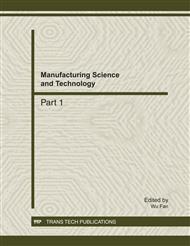p.358
p.366
p.372
p.379
p.385
p.390
p.395
p.400
p.408
A Hybrid Algorithm to Solute the Problem of the Robot Path Planning
Abstract:
This paper analyzes the problems of artificial potential fields in robot path planning. A hybrid algorithm for robot path planning is proposed. Robot searching for path in artificial potential fields method, it is possible that the robot can’t reach the goal because of local minimum, when it is best to use a genetic algorithm for robot. Simulation results show the effectiveness of the models, and it can effectively solve the problem caused by defects of artificial potential fields in the path planning.
Info:
Periodical:
Pages:
385-389
Citation:
Online since:
November 2011
Authors:
Price:
Сopyright:
© 2012 Trans Tech Publications Ltd. All Rights Reserved
Share:
Citation:


